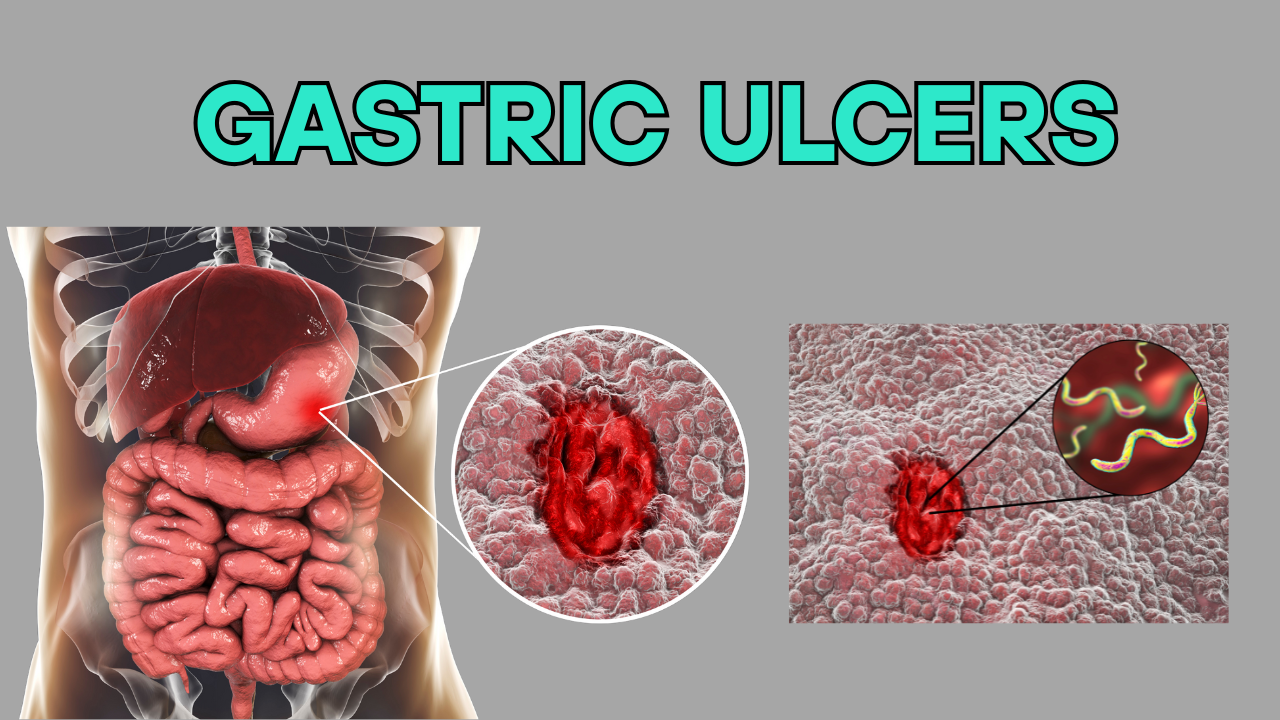- everything you need to know about -
Gastric Ulcers
watch a
video
- HEALTH & WELLNESS -
GASTRIC
ULCERS
A gastric ulcer, often called a stomach ulcer, is more common than many people realize. It’s a type of open sore in the stomach lining that can cause pain, discomfort, and even serious complications if ignored. While stress and spicy food often get blamed, the real causes usually go much deeper.
In this post, we’ll break down the key facts about gastric ulcers, including their causes, common symptoms, and simple ways to find relief. Whether you’ve been recently diagnosed or just want to understand the condition better, this article is here to help — without the jargon.
🧪 What Is a Gastric Ulcer?
A gastric ulcer is a type of peptic ulcer that occurs when the protective layer of mucus in the stomach gets damaged. This layer usually shields the stomach from strong digestive acids. But when it’s worn down, the acid begins to harm the stomach walls, leading to ulcer formation.
These sores can vary in size, but even a small one can cause ulcer pain or a burning feeling in the upper abdomen.
🔍 What Causes Gastric Ulcers?
The most common causes of stomach ulcers include:
Helicobacter pylori (H. pylori) infection: This spiral-shaped bacteria lives in the stomach and can damage its lining over time.
Frequent use of NSAIDs (non-steroidal anti-inflammatory drugs): Medications like ibuprofen, aspirin, and naproxen can irritate the stomach when taken too often.
High levels of stomach acid: Some people naturally produce more acid in the stomach, especially if they have conditions like Zollinger-Ellison syndrome.
Smoking and alcohol: Both habits weaken the stomach’s natural defenses.
Stress and diet: While not direct causes, they can worsen symptoms or slow healing.
⚠️ Recognizing the Symptoms
Gastric ulcer symptoms can vary, but the most common include:
Burning stomach pain (often between meals or at night)
Feeling full quickly
Bloating or belching
Nausea or vomiting
Loss of appetite or weight
Dark or tarry stools (a sign of bleeding)
The ulcer pain often feels like a dull ache and might get better or worse with food. Some people mistake it for indigestion or hunger pangs.
🧬 How Is It Diagnosed?
If you’re experiencing persistent stomach pain, it’s important to talk to a doctor. They may recommend:
Endoscopy: A thin tube with a camera is used to view the stomach lining.
H. pylori test: This can be done through blood, stool, or breath tests.
Imaging tests: X-rays or CT scans in rare cases to rule out complications.
Diagnosing the cause helps guide the right treatment and ensures faster healing.
💊 Treatment Options That Work
The good news? Gastric ulcers are treatable, especially when caught early.
Treatment usually involves a mix of medications and lifestyle changes:
Antibiotics: If H. pylori is present, a combination of antibiotics is prescribed.
Proton pump inhibitors (PPIs): These reduce acid in the stomach, helping the ulcer heal.
H2-receptor blockers: Another type of acid-reducing medication.
Antacids: For quick relief from symptoms.
Avoiding NSAIDs: If you rely on painkillers, your doctor may suggest safer alternatives.
Most ulcers heal within 4 to 8 weeks with proper treatment.
🍽️ Diet and Lifestyle Tips for Faster Healing
While no specific “ulcer diet” exists, some foods can soothe symptoms while others may trigger them.
Helpful habits:
Eat small, frequent meals.
Stay hydrated.
Include foods rich in fiber, probiotics, and vitamin A (like carrots and leafy greens).
Avoid smoking and limit alcohol.
Reduce stress through walking, meditation, or deep breathing.
Foods to limit:
Caffeine and carbonated drinks
Spicy or acidic foods
Fried or fatty meals
Remember: healing the stomach lining is easier when your body isn’t fighting irritants every day.
❗ When to See a Doctor
If you notice any of the following, seek medical attention immediately:
Sharp, sudden stomach pain
Vomiting blood or dark substances
Difficulty breathing
Unexplained weight loss
Blood in stool
These could be signs of a bleeding or perforated ulcer — a medical emergency.
💬 Final Thoughts
Gastric ulcers can disrupt your daily life, but they’re manageable and treatable. Early detection, lifestyle changes, and the right medications can bring lasting relief. If you’re feeling constant discomfort or suspect something isn’t right with your stomach, don’t ignore it.
Take care of your gut — it’s more powerful than you think.
.

